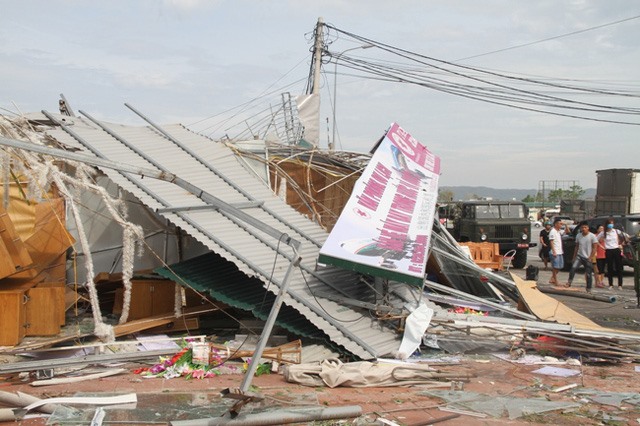 Politics & Law
Politics & Law

Governments have been asked to encourage the private sector, particularly small-and-medium enterprises (SMEs), to get involved in the fight against natural disasters, given their vulnerability to extreme weather.
 |
| Several businesses in Hà Tĩnh Province were affected during the Doksuri Typhoon in the central region last week. - Photo cafef.vn |
NGHỆ AN — Governments have been asked to encourage the private sector, particularly small-and-medium enterprises (SMEs), to get involved in the fight against natural disasters, given their vulnerability to extreme weather.
At the eleventh Senior Disaster Management Officials Forum at the Asia-Pacific Economic Co-operation meeting in Vinh City, Nghệ An Province, participants discussed how to ensure business continuity after disasters struck.
According to the officials, SMEs were particularly susceptible to disasters due to a lack of investment in risk management. SMEs account for more than 97 per cent of all enterprises in the Asia-Pacific, the most disaster-prone region in the world. An average of 40 per cent of the world’s natural disasters occur every decade, the Asia-Pacific Disaster Report said in 2015.
In Việt Nam in particular, 85 per cent of SMEs are unnecessarily affected by seasonal storms mainly because of the lack of disaster-response plans.
“The private sector is vulnerable to (business) interruptions during natural disasters. This is why at APEC this year we promote business continuity planning (BCP) to enhance its resilience,” Wei-Sen Li, Secretary General of Taipei’s National Science and Technology Centre for Disaster Reduction, told Việt Nam News.
A BCP is generally an outline of several disaster scenarios and the responses that each business will take to resume operation.
The method has yet to be introduced to Việt Nam, despite being quite common in other developed countries, such as the US, Japan and Singapore, Asia Foundation’s Senior Programme Officer for Environment and Sustainable Development Nguyễn Trí Thanh told Việt Nam News.
“This model will help Vietnamese enterprises to map out their own action plans and business strategy to minimise the impacts of disasters,” Thanh said.
After the last working session on Friday morning, the forum closed with the region’s senior officials adopting an official recommendation on disaster management, which will be submitted to leaders attending the APEC Summit in November.
The Vinh Recommendation includes 11 points, suggesting the APEC economies encourage science and technology research to support decision-making in disaster management while promoting the application of advanced technology in disaster prevention in the face of "new normal" extreme weather.
The world has recently come up with the term “new normal” to describe increasingly complicated and unpredictable natural disasters in terms of their frequency, intensity and impact levels.
"New normal" natural disasters refer to not only extremely strong storms, but also to other disasters, such as landslides, coastal land erosion and tsunamis.
The recommendation also called for strengthened co-operation between APEC members to share experiences in reducing disaster risks.
A more active role of the private sector in the fight against natural disasters was also recommended. — VNS




